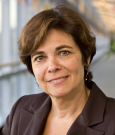Attendees at this year’s annual conference of the National Comprehensive Cancer Network (NCCN) not only got up to date on the Guidelines but left with a better understanding of how children deal with a parent’s cancer, and how oncology providers can best help. Panelists for the NCCN roundtable discussion, The Child’s Experience When a Parent Has Cancer, concluded that honest, caring communication, appropriate to the child’s age and temperament, is essential, and that oncology providers should institute programs that help families deal with the illness.
The session was moderated by Lillie D. Shockney, RN, Director of the Cancer Survivorship Program at Johns Hopkins Medicine, Baltimore, who introduced the conversation by sharing her own experience as the mother of a 12-year-old when diagnosed with breast cancer. She was diagnosed with cancer in the contralateral breast 3 years later.
Her daughter reacted with a mixture of fear, misunderstanding, and—fortunately—unintentional humor that the family continues to harness to this day, balancing the distress and insecurity of a cancer diagnosis. “Without realizing it, our daughter found our sense of humor, and every day my husband and I make sure we find something funny about the fact that I have been diagnosed with cancer,” Ms. Shockney shared.
She said she learned the importance of referencing “hope” in those early conversations. Hope can take many forms but always incorporates the future well-being of the family and is not eroded by honesty, she emphasized.
Openness Is Important
The panelists strongly agreed that, as hard as it may seem, children need honest information about the cancer diagnosis and even the possibility of death. This means that parents, caregivers, and providers should address all questions, thoughts, and emotions, with clear language, avoiding confusing euphemisms.
“When children are forewarned, talking about death does not raise their anxiety,” explained Martha
Aschenbrenner, MA, a palliative care counselor at The University of Texas MD Anderson Cancer Center, Houston, who is also a child life specialist, a pastoral counselor, and a cancer survivor herself.
While the natural instinct is to keep frightening information out of the reach of children, those who receive “honest information” are actually better able to understand, to cope, and to trust in the people caring for them, than children who are shielded, she explained.
Tailor the Conversation
Conversations about cancer should be tailored to the child’s age and temperament. This is the foundation for work that is done at Massachusetts General Hospital Cancer Center, Boston, with its program, the Marjorie E. Korff Parenting at a Challenging Time (PACT) Program (www.MGHPACT.org). PACT, which is staffed by child psychiatrists and psychologists, is a “parent guidance consultation model” that is individualized based on the parent’s description of the child.
“Our program respects that the parent is the expert on his or her own children but needs help in addressing the challenges of living with cancer,” said Paula K. Rauch, MD, Founding Director of PACT and Associate Professor of Psychiatry at Harvard Medical School, Boston.
PACT clinicians provide individual consultations with parents and seek to learn about the child’s age, temperament, behavior, and concerns he or she may have expressed. These consultations help prepare parents for talking with their children and dealing with issues and needs that might arise.
Child Development Principles
Aside from a child’s unique personality, perspective, and situation, there are certain child development principles that should be appreciated when talking to children about cancer, the experts said. Children younger than age 6 have a poor concept of time and do not understand the meaning of “forever.” A good way to explain death is that the parent “will not breathe, eat, hurt, or come back.” When the parent is terminally ill, this conversation should begin early on to prepare the child.
School-age children express their thoughts more easily, understand that sickness can lead to death, and are likely to ask blunt questions. These should be answered honestly, and repeated affirmations that “everything will be okay” should be avoided. Virtually all school-age children worry about their parent dying, and their fears should be openly addressed.
For teenagers, dealing with a parent’s cancer diagnosis can actually be character-building. A prompt, honest, but sensitive discussion was advised by Maya Silver, who coauthored with her father, My Parent Has Cancer and It Really Sucks. “Withholding the news often results in teenagers hearing the news accidentally, and this creates a perceived breach in trust,” she noted.
She reminded listeners that teenagers view dishonesty as a lack of respect and trust, and are resentful of being misled, or “lied to.” Since teenagers will search the Internet for information, caregivers and providers should ensure that their information is accurate. While teenagers like to be up to date on the parent’s treatment and condition, she cautioned, “Be honest within reason.”
Zoraida Sambolin, former anchor of CNN’s Early Start, was diagnosed with breast cancer when her son was 14. She was surprised by his resiliency, the way he educated himself, and his ability to create a support network among his friends.
“My son chose to walk the journey with me. It taught me that kids can handle a lot more than we think they can and that when he faces adversity, he is going to be able to handle it,” she added.
Responsibility of Oncology Providers
Unfortunately, despite the need for specialists in this area, most communities and hospitals offer little guidance for families impacted by cancer. In the absence of structured programs, the person usually charged with speaking to the children “is you,” Ms. Aschenbrenner told NCCN attendees.
Bruce Ham, who wrote about his experience of being widowed with three young daughters in Laughter, Tears, and Braids, also urged providers to be proactive. “You, more than anyone, are in the position to prepare families for what could come to be,” he emphasized.
At 39, his wife lived only 6 months after her metastatic colon cancer diagnosis—leaving Mr. Ham surprised and unprepared. “It’s great that we maintained hope,” he said, “but I wish I would have had more time to ask my wife questions, to get her perspective on life, for her to make memories for my girls. I wish I had her counsel before she was so riddled with drugs that these conversations were trying for both of us.”
In the aftermath of her death, Mr. Ham joined a support group, Single Fathers Due to Cancer, part of the University of North Carolina at Chapel Hill. He now blogs about the experience of raising three daughters as a single father on his website, www.therealfullhouse.wordpress.com.
Creating a Legacy
Part of being mindful of the child’s experience, and of honoring the parent dying of cancer, is to create a legacy for the children, the panel agreed. This can be in the form of letters, videos, scrapbooks, and cards to be opened on significant occasions—and the process should be initiated while the parent is still up to the task, they said.
“Write a letter about what you see in your child that is special; share a unique parenting memory,” Dr. Rauch tells patients. ■
Disclosure: Ms. Shockney, Ms. Aschenbrenner, Dr. Rauch, Ms. Silver, Mr. Sambolin, and Mr. Ham reported no potential conflicts of interest.




